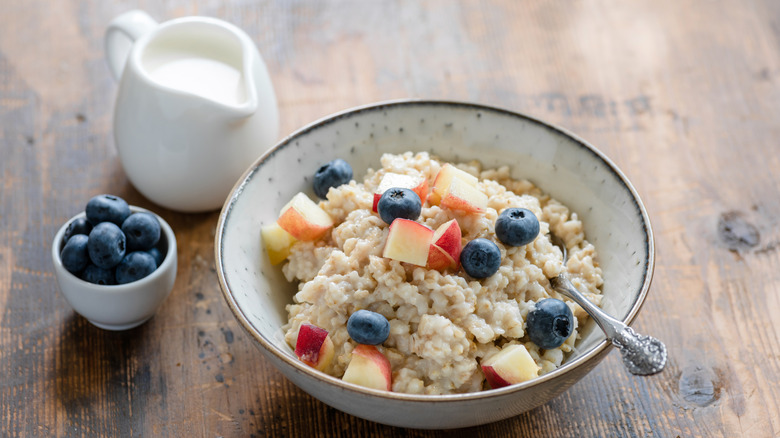Can These 3 Breakfast Foods Kill Cancer? The Answer Is Complicated
Cancer ranks second behind heart disease as the leading cause of death in the United States, accounting for 18.5% of all deaths, according to the National Cancer Institute. You might be surprised to know that cancer is the number one cause of death in people younger than 65. However, thanks to preventive cancer screenings and research, many cancers have high survival rates when detected early.
Your lifestyle can play a significant role in reducing your risk of cancer and helping your body heal after cancer treatment. A diet rich in fruits, vegetables, and whole grains can provide antioxidants, which can fight off the free radical damage that can lead to cancer.
Folate, a B vitamin found in many of your favorite breakfast foods, helps with DNA repair and may prevent, not kill, cancer. Many breakfast cereals — even kid-friendly cereals like Cap'n Crunch — are fortified with folate. A cup of Cheerios gives you 50% of your daily value (D.V.) for folate plus other B vitamins and minerals. (Here are other cereals that are good for you.) Pair your cereal with a glass of orange juice to add another 74 micrograms of folate (19% of your D.V.). Add a cup of sliced strawberries to your cereal for another 40 micrograms of folate (10% of your D.V.). However, folate's role in cancer is rather complex.
Folate might prevent cancer but also accelerate its growth
Older studies focused on the role of folate in cancer risk have been mixed. A 2003 article in The Journal of Nutrition found that people who had the highest intake of folate in their diets were 40% less likely to develop colorectal cancer than those with low folate. Folate can prevent cancer because it supports DNA methylation, which is the process of turning genes on and off, according to a 2007 editorial in The American Journal of Clinical Nutrition. This process can suppress harmful genes that promote cancer growth. Adequate folate in your diet supports the stability of your DNA and reduces the risk of gene mutations that could cause cancer.
However, folate can't help you if you already have cancer because cancer cells use folate as fuel for their growth. This can be concerning because 30% of adults over 60 have intestinal polyps that could be precancerous, and many don't have colonoscopies to have them removed. People taking folic acid supplements (a synthetic form of folate) should stay updated on their cancer screenings.
Fruits and whole grains can prevent cancer
Getting your folate from whole foods is probably wiser than taking folic acid supplements because high-folate foods also have antioxidants that can support your immune system. Phytochemicals found in fruits and vegetables can trigger the death of cancer cells, according to a 2019 article in Cancers. Citrus fruits such as oranges are high in flavanones that scavenge for free radicals and promote cancer cell death. These flavanones also stop cancer cells from growing and dividing.
Strawberries are rich in the flavonol kaempferol, which is another anticancer compound. Kaempferol also has anti-inflammatory, antimicrobial, and neuroprotective effects. Strawberries are also good sources of fisetin, which has been found to kill cancer cells in lab studies. If you don't like orange juice or strawberries, you can enjoy bananas for their anticancer catechins.
Breakfast cereals such as Cheerios might be high in folate, but make sure that your cereal is a good source of whole grains. Cheerios is made from 100% whole-grain oats, and you'll get 34 grams of your daily recommended whole grains. Including more whole grains in your diet can lower your risk of dying from cancer by up to 12%, according to a 2020 review in Nutrients. Whole grains can also reduce your risk of colorectal, gastric, pancreatic, and esophageal cancers. You don't want cereal with refined grains, however, because they might increase your risk of gastric and colon cancers.


